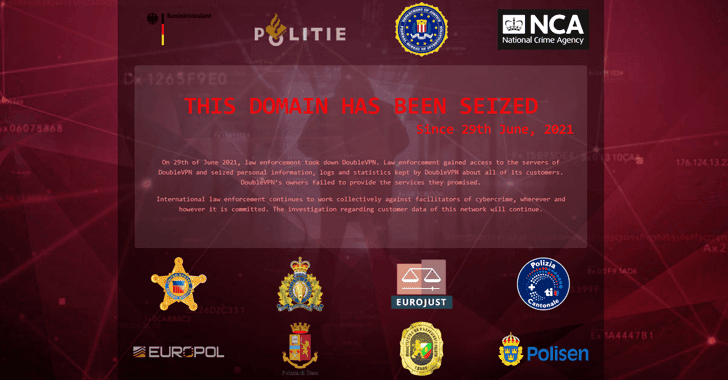Law enforcement of Europe has seized the servers and log files of DoubleVPN that has been continuously used by Cybercriminals for the double-encryption service to bypass detection
Apart from Europe, the United States and Canada have also seized the domains and servers of DoubleVPN. The security researchers of the Europol agency affirmed that the threat actors have used a virtual private network service as a “safe haven” to conceal their main identity all over the world.
DoubleVPN is a Russian VPN service that generally double-encrypts data that is passing through it, and currently, the cybercriminals are targetting DoubleVPN for the execution of their ill-disposed activities.
When the service is being used, at that time the requests are encrypted and dispatched to one VPN server, which later gets forwarded to another VPN server, and doing this the hackers can easily accomplish their ultimate goals.
International coordination
The international coordination of law enforcement agencies was done centrally, as this attack has been spreading all around the world.
- Europol’s European Cybercrime Centre (EC3)
They have helped in the investigation from the beginning, and they brought together all the countries that were involved in the joint strategy.
- Eurojust
They have supported and at the same time served judicial cross-border interaction and coordination, and they guaranteed a satisfactory response in order to take down the network.
Servers & data seized by law enforcement agencies
Initially, the law enforcement had seized the DoubleVPN on 29th June, by claiming that they obtained access to the servers for DoubleVPN and took logs, statistics, and all kinds of personal information of the customers of the service.
The experts also stated that international law enforcement remains to work against facilitators of cybercrime, and will find the details that where and how its attacks were performed.
Authorities & Agencies participated
The Netherlands:-
National Police (Politie), National Public Prosecutor’s Office (Landelijk Parket)
Germany:-
Federal Criminal Police Office (Bundeskriminalamt), Prosecutor General’s Office Frankfurt am Main – Cyber Crime Center
United Kingdom:-
National Crime Agency (NCA)
Canada:-
Royal Canadian Mounted Police (RCMP)
United States:-
Federal Bureau of Investigation (FBI), US Secret Service (USSS), US Department of Justice (DOJ)
Sweden:-
Swedish Police Authority (Polisen), Swedish Prosecution Authority (Åklagarmyndigheten)
Italy:-
State Police (Polizia di Stato, Servizio Polizia Postale e delle Comunicazioni Roma, Compartimento Polizia Postale e delle Comunicazioni Lombardia), Public Prosecutor’s Office of Milan (Procura della Repubblica di Milano)
Bulgaria:-
General Directorate for the Fight against Organised Crime of the Bulgarian Ministry of Internal Affairs
Switzerland:-
Cantonal Police Ticino (Polizia Cantonale del Cantone Ticino), Public Prosecutor’s Office Ticino (Ministero Pubblico del Cantone Ticino)
Europol:-
European Cybercrime Centre (EC3), Eurojust
Moreover, the security analysts and authorities asserted that since this type of attack is engaged in ransomware attacks, that’s why it is very important to stop such threats and attacks.
So, for this reason, Europol has announced that “The golden age of criminal VPNs is over,” in one of their reports.
Also Read: Cyber Police Seized Bot Farm that used to Send Large Scale Spam Emails
You can follow us on Linkedin, Twitter, Facebook for daily Cybersecurity and hacking news updates










